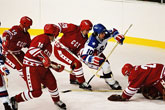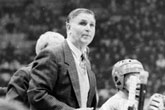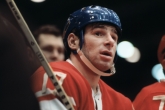USA 4 - USSR 3: Remembering the Miracle, remembering Tikhonov


Drawing by Natalia Mikhaylenko.
"Eruzione sneaks in from the blue line... Picks up the puck… Skates in on the Soviet goal… Shoots…Score! Mike Eruzione!"
Those were perhaps the most spellbinding seconds of the first eight years of my life. My eyes were glued to the television screen like flies to flypaper. Mike Eruzione's third-period goal brought the score to 4-3 in America's favor and my father was bursting with joy: "Now we're going to win! We're going to beat those bastards!"
I still could not understand what exactly it all meant, but I had a bad feeling. I also could not understand why my father was so happy - I wasn't. There were about seven minutes left in the third period. My eyes were practically penetrating the TV screen. "… 11 seconds, 10 seconds… Five seconds left in the game. Do you believe in miracles? YES!"
That night, with the score unchanged, the U.S. ice hockey team beat the Soviets and two days later went on to win the 1980 Winter Olympics gold medal by defeating Finland. For the U.S. it was indeed a miracle on ice, since its national team consisted of mainly inexperienced college students and no one had expected them to even win a bronze. Their gold medal was a major coup for the nation's image and added myriad points to the United States’ side of the Cold War scoreboard.
My father was on cloud nine. He had been berating Viktor Tikhonov from the beginning of the tournament: "He's a tyrant! He keeps the players in barracks, has them train day and night and doesn't let them see their families. He treats them like slaves!" (We had emigrated from the USSR about a year earlier and my father, an inveterate Zapadnik, or supporter of the West, did not have very fond memories of his service in the Red Army).
But for me the Soviet team's loss was not a happy moment. I felt that it was also my loss. And I remember that, as my parents were popping open the champagne that night, I decided to go to bed early.
When I was about five or six years old and still living in Moscow, Vladislav Tretiak was my idol. I had posters of him over my bed and although I did not exactly understand the meaning of CCCP (USSR) on his national jersey, I did understand, thanks to my father's nasty insinuations, the letters ЦСКА(Central Sports Club of the Army) on his club jersey.
There was an outdoor rink in the neighborhood and every winter I would be there chasing the puck and tending the goal until I was covered with black and blue. I was fascinated with the equipment that professional goalies had: the leg pads, the blocker, the trapper and the mask - the piece that made the goalie the most enigmatic player of all. I watched all the ЦСКА matches I could on TV, seeking out my idol, studying his moves, his incredible saves.
When I entered first grade in 1978 I inquired about the possibility of playing on a team. I was really excited. I knew that it would not happen right away, but I was patient - I felt that my dream of playing organized hockey and maybe one day meeting Tretiak would sooner or later come true. But then, three months later, something unexpected happened, something that had not been in my plans at all: We emigrated.
The first thing I asked for when we were in the West was a goalie mask. My father bought me a white one similar to the one worn by Ken Dryden, the best NHL goalie of the 70s, who led the Montreal Canadiens to six Stanley Cups. The New Jersey towns we first lived in did not have an ice rink, so I started playing street hockey, while following the New York Rangers and Islanders on TV.
Going into the 1980 Olympics, the Soviets were the favorite to win the ice hockey gold. They had won the last four consecutive Olympics. However, in 1980 they had a new line up, with players competing internationally for the first time, and the great Kharlamov-Petrov-Mikhailov line was not as dynamic as before. They also had a new coach, Viktor Tikhonov, who, although having won the last two World Ice Hockey Championships, had never coached during the Olympics. But the Soviet team still had their backbone, their most brilliant star, their savior: Vladislav Tretiak (who today is considered one of the best goaltenders of all time).
The Soviet team easily won the first five matches. Glory was two games away. The gold was already sparkling before their eyes. They just had to get past some silly American kids and then crush the Swedes in the last game of the final round.
But, lo and behold, the American kids score two goals in the first period, tying the game at two. What's more, and this was the most mindboggling moment for me, Tikhonov pulls Tretiak for letting in the second goal just one second before the end of the first period and replaces him with Vladimir Myshkin! I was confused. I was utterly devastated. I hated Tikhonov at that moment. How can anyone be better than Tretiak? Was Tikhonov really the despicable tyrant my father was talking about
While growing up in Westchester County, New York, I played floor hockey in the tournaments at my high school in Pleasantville and ice hockey for a team in New Rochelle. On the floor I was a left-winger, but on the ice I was the starting goaltender (actually, I was the only goaltender - the team was small).
I was not a good goalie: I was quick with the trapper, but slow and cumbersome on the skates; I could never do the full butterfly and it took me ages to move across the crease. However, until I stopped playing at the age of 15, I never missed a televised match with the Soviet team. It galvanized me. It transported me to another dimension. Locally, I was an Islanders fan, but during international competitions I always rooted for those four letters: C-C-C-P.
In the 80s the Soviet team won three Olympic gold medals: in 1984 (the year Tretiak retired), in 1988 and in 1992 as the Unified Team, a potpourri of players from the former Soviet republics. From 1981 to 1990 they also won six World Championships.
Their coach in that period was Viktor Tikhonov, against whom I still bore a big grudge for having replaced Tretiak in Lake Placid. He was a controversial coach. In America he was considered one of the best living coaches, but his authoritarian approach made it difficult to like him personally. He was ruthless, suppressed individuality and cared about only one thing: Soviet victory (on the ice and off). When in the late 80s Russian hockey stars such as Fetisov and Larionov expressed their desire to play in the NHL, Tikhonov spearheaded the Soviet authorities' refusal to grant them permission. Finally, Gorbachev's glasnost policies opened the borders and, starting in 1989, Soviet players began playing for NHL clubs.
No one will deny that Tikhonov was a severe and highly demanding coach ("cute euphemisms," my father would say now). But it is also true that he was no more demanding than the famous Anatoli Tarasov, who had been head coach of the national team from 1958 to 1960 and assistant coach to Arkady Chernyshev from 1961 to 1972. In fact, it was the Tarasov-Chernyshev tandem that launched the Soviet team to superpower status. For Soviet national players, therefore, training in those conditions was difficult, but it was a routine - they did not know of less difficult conditions. Those conditions, and coaches, were overly severe in the eyes of foreign observers; but for the great Soviet players they were standard, a normal test of athletic superiority.
In total, the (men's) Soviet national ice hockey team won seven Olympic gold medals and the Unified Team won one. Only Canada, the USSR's main rival, won more gold medals: nine. But Canada had been participating in the Olympics since the beginning in 1920, whereas the USSR started playing only in 1956.
The Soviet team also won 22 World Championships (and after the collapse of the USSR, Russia won five). Canada has 24 World Championships, but 15 of them were won between 1920 and 1954, the year that the USSR entered the competition.
There were other tournaments:
1. The Summit Series of 1972 and 1974, in which the Canadian NHL All-Stars won the first series, the USSR the second;
2. The Canada Cup (1976 and 1991), in which Canada won four titles and the Soviets one;
3. The 1979 Challenge Cup, in which the Soviets defeated the NHL All-Stars.
4. The Super Series, a barrage of 18 series - each with four to seven games - that took place in North America between 1976 and 1991, in which the Soviet clubs won 14 series, the NHL clubs two and the other two series ended in ties.
The year 1980 was the most intense period of Soviet and North American ice hockey rivalry. And I felt that zeal oozing out of the television screen as I was watching the U.S.-USSR match at the Winter Olympics. Later, somewhere in the back of my mind, playing ice hockey for me was equal to participating in the Cold War, which made the sport even more exciting.
Today, whenever my father and I look back at that historic match and everything associated with it - our immigration, the novelty of America, Tikhonov punishing Tretiak, my preoccupation with the Soviet team's loss - our conversation always ends with him saying, "I'm so happy I got you out of that place. You don't know what it was like living in the USSR!" And he is right - I do not. I was only seven years old when we left. I did not even understand what those four letters stood for. I just supposed and intuited something that now is an established fact: that C-C-C-P stood for the best national ice hockey team in the history of the sport.
All rights reserved by Rossiyskaya Gazeta.
Subscribe
to our newsletter!
Get the week's best stories straight to your inbox


